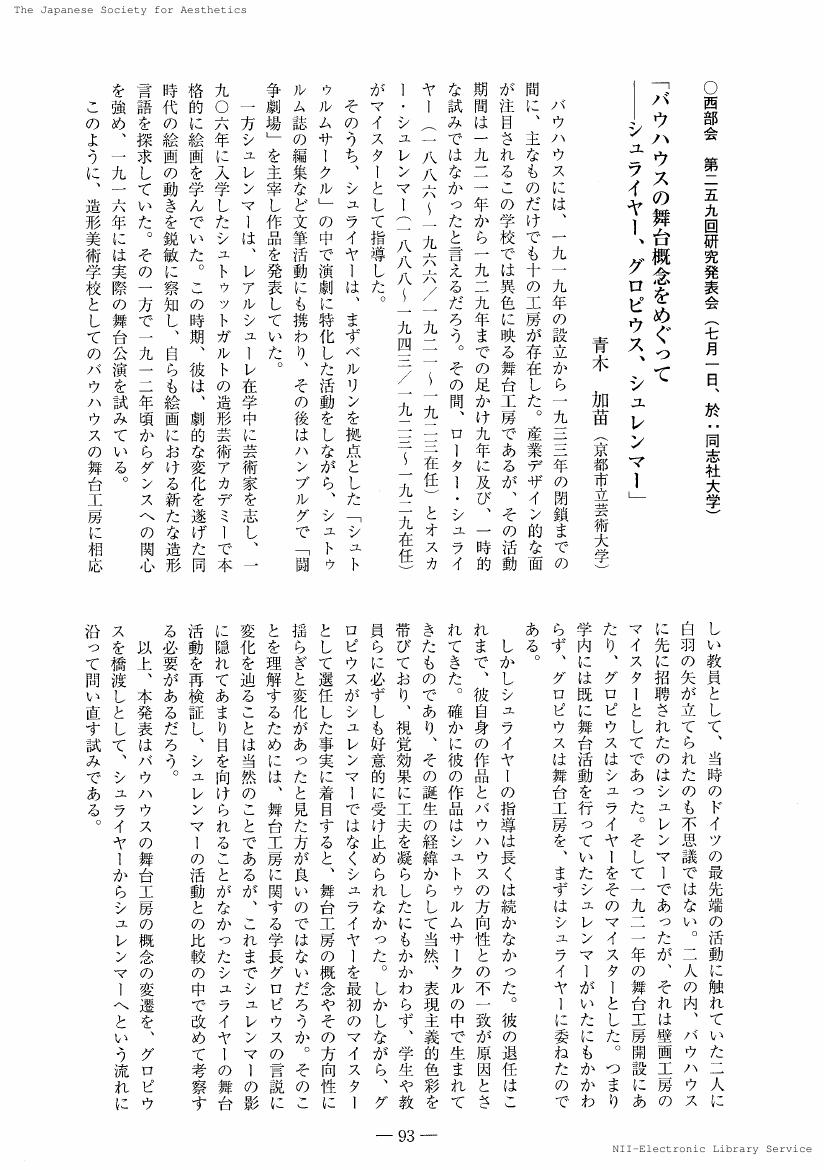- 著者
- 青木 加苗
- 出版者
- 美学会
- 雑誌
- 美学 (ISSN:05200962)
- 巻号頁・発行日
- vol.63, no.1, pp.188, 2012-06-30 (Released:2017-05-22)
- 著者
- 青木 加苗
- 出版者
- 美学会
- 雑誌
- 美学 (ISSN:05200962)
- 巻号頁・発行日
- vol.57, no.2, pp.93, 2006-09-30 (Released:2017-05-22)
1 0 0 0 OA バウハウスの舞台概念をめぐって : シュライヤー、グロピウス、シュレンマー
- 著者
- 青木 加苗
- 出版者
- 美学会
- 雑誌
- 美学 (ISSN:05200962)
- 巻号頁・発行日
- vol.57, no.3, pp.29-42, 2006-12-31 (Released:2017-05-22)
Although Lothar Schreyer, who had some initial theatrical experience at the Sturm in Berlin, first headed up the Bauhaus theater workshop, the ideas and concepts of the workshop have been commonly associated with the other master of the workshop, Oskar Schlemmer. Schreyer left the Bauhaus because of discord between his work and the orientation of the Bauhaus under the direction of the first director Gropius. There is, however, the apparent influence of Schreyer in the theatrical concepts which Gropius stated several times, even after Schreyer's resignation. On the other hand, Gropius also had some ideas, which were not similar to Schreyer's, but closer to those of Schlemmer. In this paper, the characteristics of each master's theatrical concept are examined and compared with that of Gropius. Schreyer's theater can be defined as "a function to transmit implications" and Schlemmer's as "internalization of principles." With these classifications, it becomes possible to review the workshop in its early years, and demonstrate that inconsistency between Schreyer and the Bauhaus existed from the beginning. Yet, it is also true that while Schreyer left the Bauhaus, his concepts and ideas did not completely disappear: even in Schlemmer's theatrical concept, the influence of Schreyer can still be found.
1 0 0 0 OA バウハウスの舞台概念をめぐって : シュライヤー、グロピウス、シュレンマー
- 著者
- 青木 加苗
- 出版者
- 美学会
- 雑誌
- 美學 (ISSN:05200962)
- 巻号頁・発行日
- vol.57, no.3, pp.29-42, 2006-12-31
Although Lothar Schreyer, who had some initial theatrical experience at the Sturm in Berlin, first headed up the Bauhaus theater workshop, the ideas and concepts of the workshop have been commonly associated with the other master of the workshop, Oskar Schlemmer. Schreyer left the Bauhaus because of discord between his work and the orientation of the Bauhaus under the direction of the first director Gropius. There is, however, the apparent influence of Schreyer in the theatrical concepts which Gropius stated several times, even after Schreyer's resignation. On the other hand, Gropius also had some ideas, which were not similar to Schreyer's, but closer to those of Schlemmer. In this paper, the characteristics of each master's theatrical concept are examined and compared with that of Gropius. Schreyer's theater can be defined as "a function to transmit implications" and Schlemmer's as "internalization of principles." With these classifications, it becomes possible to review the workshop in its early years, and demonstrate that inconsistency between Schreyer and the Bauhaus existed from the beginning. Yet, it is also true that while Schreyer left the Bauhaus, his concepts and ideas did not completely disappear: even in Schlemmer's theatrical concept, the influence of Schreyer can still be found.


